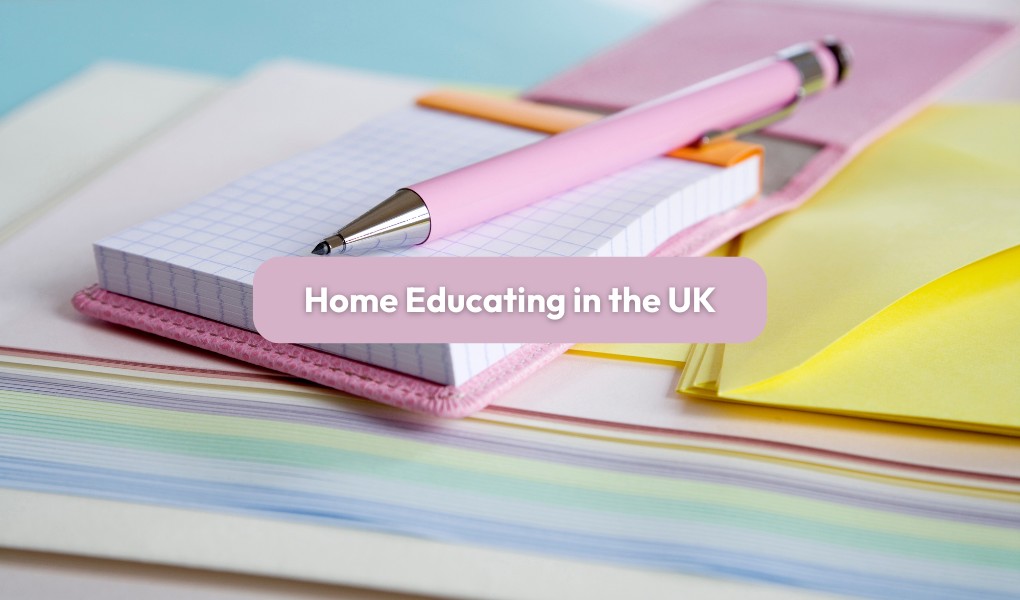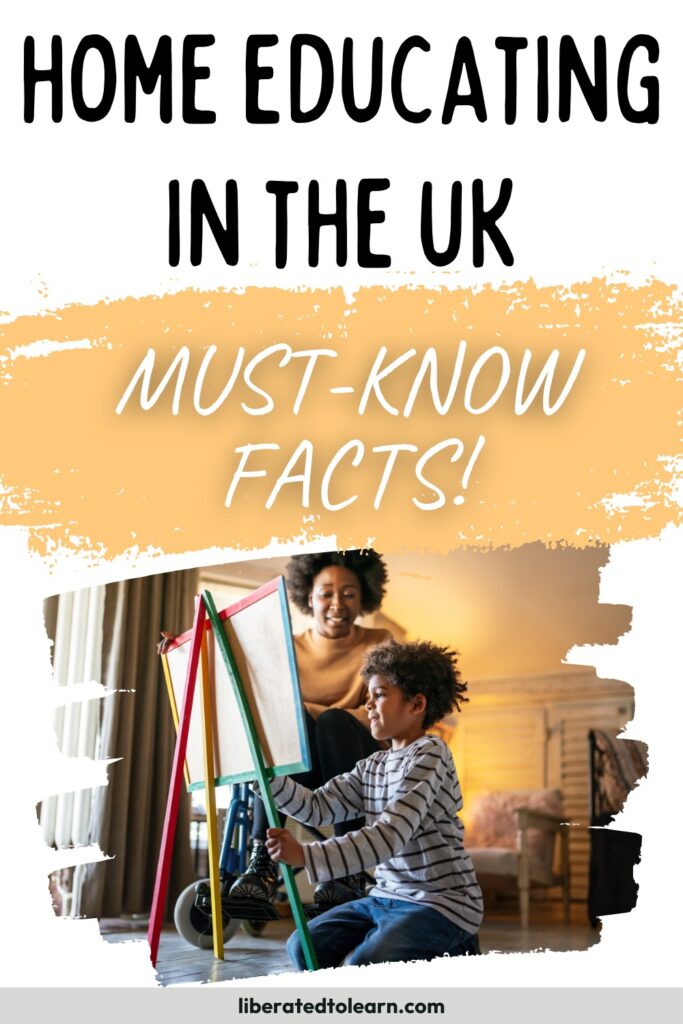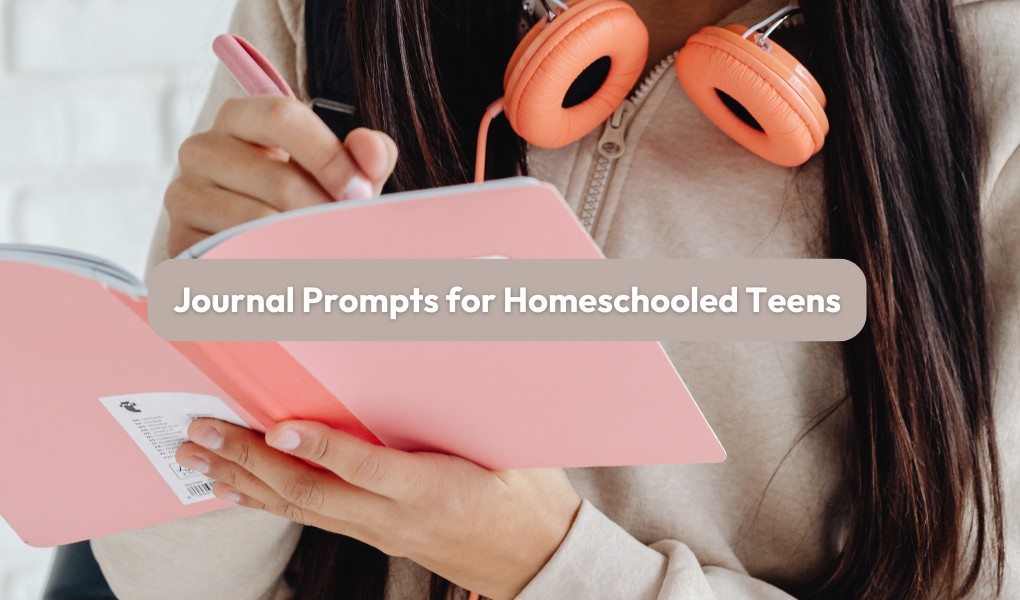By the end of this post, you’ll learn what home education is, why people choose to home educate, the benefits of home education, and all the must-know facts about home educating in the UK.

Are you in the UK and thinking about home educating your child? Well, you’re not alone! More families than ever are now embracing this flexible, more personal approach to education. The question is, do you know the facts about home educating in the UK and where to start?
By the end of this post, you’ll learn what home education is, why people choose to home educate, the benefits of home education, and all the must-know facts about home educating in the UK.

What is Home Education?
Home education, in simple terms, is when a parent or guardian decides not to put their child in school—or deregisters them from school—and instead takes full responsibility for their education.
It’s a completely legal alternative to traditional schooling and can take the shape of many learning styles, such as unschooling.
Why Do Parents Decide to Home Educate?
The choice to home educate is a personal decision and the reasons often vary from family to family. Some families feel that it’s the best decision for their children; others may be forced to withdraw their children from school if their needs are not being met.
Here are some of the most common reasons why parents decide to home educate their children:
- They do not agree with the traditional schooling system and its methods.
- They want to spend more time with their children.
- They want to give their children more real-world experiences and teach them life skills.
- They want to give their children more freedom and flexibility, both in their lives and education.
- They want their children to follow their own interests.
- They want their children to learn at their own pace.
- Their children are not benefiting from school.
- Home education aligns more with their philosophy and values.
- Their children are experiencing bullying and peer-pressure.
- Their children’s needs (SEN) are not being met in school.

Must-Know Facts About Home Educating in the UK
Home education might mean the same thing across the world (also commonly known as homeschooling) but the facts and rules vary from country to country.
If you’re planning on home educating in the UK, then here are the must-know facts about home education.
It’s completely legal
In the UK, parents have the legal right to educate their children at home. And although it might be seen as the alternative, it’s actually a right that every family has. Under the Education Act 1996, parents in the UK have a legal responsibility to ensure their child receives a suitable education, but this doesn’t have to take place in a school setting. As long as you’re providing an education which is appropriate to your child’s age, ability, and any special needs, you have the freedom to decide how and where your children are educated.
You can start at any time
There’s no need to wait for the start of a school year to begin home education; you can start at any time, and you don’t have to follow the traditional school term times and holidays either. You can deregister your child from school at any age to home educate.
You can also home educate at any age, whether your child has attended school or not, but it’s important to remember that once your child reaches compulsory school age, they must either start home education or start school.
You don’t need to follow the National Curriculum
The great thing about home education is the freedom and flexibility that it gives you. Unlike in school, you do not need to follow the National Curriculum. Instead, you can focus on topics that your children are actually interested in, go more in-depth, and follow a learning style which suits your family. The choice is entirely yours.
You must notify your child’s school to deregister
If you have a child in school but would like to home educate, you need to deregister them first. In order to do this, you must notify the school by sending a deregistration letter. This essentially states that you will be home educating and that you would like your child’s name removed from the school register.
You need permission to deregister your child from a SEN school
If your child has special educational needs and attends a SEN school, you will need permission from your local authority to home educate. You can request permission by sending a consent to deregister letter.
If your SEN child attends a mainstream school, however, you do not need permission to home educate from your local authority, but you’ll still need to send a deregistration letter to the school.
Related: Deregistering from a SEN School
You do not need qualifications to home educate
You do not need formal teaching qualifications to educate your child at home. In fact, you could have no qualifications, or very few, and it still wouldn’t matter. Parents often worry that they won’t be “qualified” enough, but the law doesn’t require you to have any specific certification to home educate. Many families utilise other resources to help guide them.
Local authorities may get involved
While home education is a personal choice, local authorities have a duty to ensure children are receiving a suitable education. Whilst you are not obligated to register with your local authority (unless your child has previously attended a school), they may contact you to inquire about your plans and request evidence of progress, but they cannot impose home visits, inspections, or enforce a specific curriculum unless there are serious concerns.
Related: Dealing With Your Local Education Authority
Exams are optional but accessible
While home-educated children aren’t required to take GCSEs or A-levels, they can if they choose to. Exams are typically taken as private candidates, and families are responsible for arranging and funding them. Families can also explore alternative qualifications, such as functional skills or international options like the International GCSE (IGCSE).
Support is readily available
You don’t have to feel isolated when you home educate. Support exists in many forms, whether it be online communities, blogs and forums, or connecting with other home educating families and home education groups.
It’s a lifestyle, not just an educational choice
Home education isn’t just about the educational choices that families make, it’s also about their daily choices and making education a natural part of their day-to-day life. It’s a lifestyle that embraces flexibility and freedom; it fosters a lifelong love of learning and constantly encourages curiosity. Home educating families find that their bonds are strengthened by shared experiences and the endless time they have together.
Benefits of Home Education
Now that you know the facts about home educating in the UK, let’s look at the benefits.
It’s personal for each family
One of the greatest benefits of home education is that it isn’t one-size-fits-all, like school. Everything from schedules to learning styles can be personalised to suit the needs of children and their families.
Freedom and flexibility
Home education comes with a lot of freedom and flexibility. You aren’t restricted by a schedule or curriculum, and instead have the freedom to choose how, when, and what you learn. You also have the freedom and flexibility to travel as and when you please and provide your children with amazing learning experiences.
Children follow their own interests
Not only is this a benefit but it’s also one of the main reasons why many families choose to home educate. A big part of home education is letting children discover and follow their own interests because it encourages them to learn and actually enjoy it.
Children learn at their own pace
When home educated, there’s no pressure for children to be at the same level as their peers. After all, we know that every child is different and they all have different strengths and weaknesses. When children are able to learn at their own pace they’re much happier and it can allow them to delve deeper into topics of interest.
Reduced bullying and peer-pressure
Whilst bullying and peer-pressure can still happen, it’s definitely not as prevalent as it is in schools. The great thing about home education is that parents know exactly what type of environment their child is in and what kind of people they are around. If anything were to affect their child negatively, they could swiftly take action.
More family time and bonding
Home education truly brings families closer together and strengthens bonds with shared experiences and more time to make memories.
Supportive community
No matter where you are, you’ll be sure to find support from the home education community, whether it’s in person at home education groups or online. A lot of common interests bring people together and home educators are always willing to help others and offer their words of wisdom and experiences.
Challenges of Home Education
Despite the many benefits of home education, it does come with its challenges—as does anything. Here are some of the challenges to be aware of.
It’s a big commitment
Home education is a big commitment and it places a lot of responsibility on your shoulders. It’s also pretty time-consuming because you’re always switching from different roles: parent, educator, carer, etc.,
Being judged or criticised
One particularly difficult challenge about home education is dealing with judgement or criticism. It’s something that’s out of our control, and whilst most home educators come to terms with it or simply ignore the opinions of others, it can be hard not to doubt yourself from time to time.
Related: How to Tackle Doubts About Home Education
The cost
Cost is often a big concern for parents because with their children at home, they find themselves spending more, especially on food, travel, and daily activities and clubs. If you have multiple children, things can get expensive, which is why it’s a good idea to stick to a budget.
Balancing learning and personal time
When home educating, it can be hard to balance or even differentiate between learning and personal time or home life. If there’s no distinction or not enough balance, it can be hard for parents to switch off and for children to feel motivated when it matters most.
How to Get Started With Home Education
If you’re thinking about home educating in the UK, here’s how to get started!

Discuss home education
When the thought of home educating enters your mind, the most important thing to do first is discuss it. This means discussing it with your partner and your children to make sure you are all on the same page and are happy with the decision.
Deregister from school
If your child is in school and you decide to home educate, you’ll need to deregister them from school. Simply send a deregistration letter and inform the school that you will now be home educating. You can specify when your child will be starting home education and you do not need confirmation before you home educate.
Related: How to Deregister Your Child From School (UK)
If your child has never attended school, you can start home educating straight away or when your child reaches compulsory school age. You do not need to inform your local authority.
Deschool your child
After you’ve deregistered your child from school, it’s a good idea to start deschooling. This is known as the transition period between school and home education, and it makes the process a whole lot easier and less stressful. During this time, you can let your child follow their interests, discover how they learn best, and fall in love with learning all over again.
Related:
Discover your child’s learning style
Every child will learn differently or have a preferred learning style. Some children are more hands-on and visual learners, others are more academic. There’s no right or wrong way to learn, only what works for your child. At first, it might take a bit of time to discover what works best, but embrace trial and error and don’t be afraid to make changes when needed.
Some of the learning styles include:
- Unschooling
- Homeschooling
- Eclectic homeschooling
- Worldschooling
- Montessori
- Charlotte Mason
Related: Learning Styles of Home Education: Finding the Right One
Find valuable resources
To help you home educate, it’s worth finding valuable resources that are not only going to benefit your child but also benefit you. These resources could be physical or online, free or paid, and remember you do not have to follow the National Curriculum.
Join a home education group or community
When you first start home educating, it’s definitely worth joining a home education group and finding your community. You’ll not only find support and advice, but also great friendships and people willing to share their own experiences with you.
Find your rhythm
Eventually, you’ll find a rhythm to home education and you’ll understand what works for your family and what doesn’t. You may find that you thrive on flexibility instead of having a schedule, or you may discover that your child only learns best in the evenings. Every home education journey is different—the beauty is in discovering your own path!
The Reality of Home Educating in the UK
Home education in the UK provides families with unparalleled freedom, flexibility, and opportunities. It’s more than an alternative education, it’s the norm for a lot of families and it’s a lifestyle which is embraced and encouraged.
Home education allows families to tailor their child’s education based on their unique needs and interests, and provide opportunities for personalised learning at a relaxed pace. But it also requires a significant commitment of time, effort, and resources from parents. Ultimately, for many, the benefits of fostering a love of learning and a supportive environment outweigh the hurdles, making it a fulfilling alternative to traditional schooling.

m@liberated
Want more from Liberated to Learn?
Subscribe to stay updated about new posts, resources and giveaways!












